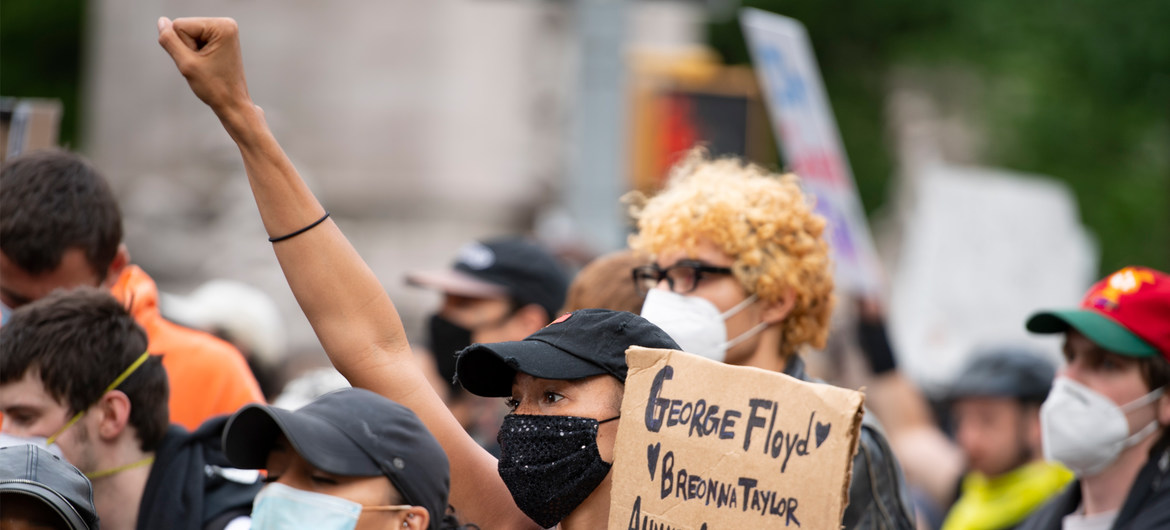
Racism: Human Rights Council calls on top UN rights official to take action
The UN’s top rights official, Michelle Bachelet, is to spearhead efforts to address systemic racism against people of African descent by law enforcement agencies, the Human Rights Council decided on Friday.
The resolution – decided unanimously without a vote – follows a rare Urgent Debate in the Council earlier in the week, requested by the African group of nations, following the death of George Floyd in the US state of Minnesota.
The unarmed African-American’s death on 25 May was captured on video while a police officer knelt on his neck for over eight minutes in Minneapolis, sparking worldwide protest.
During the debate on racism, alleged police brutality and violence against protesters that preceded the resolution’s adoption, no less than 120 speakers took the floor.
Many expressed sympathy for the family of Mr. Floyd, whose brother also addressed Council members in Geneva, in a passionate pre-recorded video message in which he urged the United Nations to act.
No international investigation
Although some delegates had called for an international probe to investigate killings of black people in America, and violence against demonstrators, others maintained that the issue impacted on all nations, and required a broader approach.
In line with the final version of the resolution text, the High Commissioner should “prepare a report on systemic racism, violations of international human rights law against Africans and people of African descent by law enforcement agencies, especially those incidents that resulted in the death of George Floyd and other Africans and of people of African descent”.
The text also calls on Ms. Bachelet – assisted by UN appointed independent rights experts and committees “to examine government responses to anti-racism peaceful process peaceful protests, including the alleged use of excessive force against protesters, bystanders and journalists”.
Overseeing the resolution, Ambassador Elisabeth Tichy-Fisslberger (Austria), President of the Human Rights Council (14th cycle) announced that the text was ready for their consideration and asked whether a vote could be dispensed with, in light of the general consensus.
“Excellencies, ladies and gentlemen, I have been informed that a number of resolutions are ready for adoption during this meeting as shown on the screen…So, I would like to ask if there is a request from anybody for a vote…I see none, so may I take it that the draft proposal L50 as orally revised may be adopted without a vote? It is so decided.”
In his address to Member States as coordinator of the African Group, Dieudonné W. Désiré Sougouri, Permanent Representative of Burkina Faso to the United Nations Office, declared the Urgent Debate “an historic step” in the combat against racism of which the Human Rights Council could be “proud”.
“The international outrage caused by the tragic events that led to the death of George Floyd underlined the urgency and importance for the Human Rights Council to raise its voice against injustice and police brutality which African people and people of African descent are faced with every day in many regions of the world,” he said.
The Council also heard widespread declarations of support for an investigation into violence against protesters supporting the Black Lives Matter movement.
Racism will remain ‘a priority’
“The fight against all forms of racism and racial discrimination remains a priority for us,” said Michael Ungern-Sternberg, Permanent Representative of the Republic of Germany to the United Nations Office at Geneva. “The past weeks, many people around the world raised their voices and took to the streets to send a clear signal that racism and excessive use of force by law enforcement officials against minority populations cannot (any) longer be accepted.”
Other speakers insisted that the resolution was necessary and important in promoting awareness about systemic racism, and in continuing the work of implementing key pledges taken to combat the scourge in 2002 at the Durban World Conference Against Racism, Racial Discrimination, Xenophobia and Related Intolerance.
“Black lives matter,” said Ambassador Coly Seck, Permanent Representative of Senegal to the United Nations Office at Geneva. Racism continues to happen in many countries too, he said, noting that it was in “flagrant contradiction” to the UN Charter in which we place our faith in the basic rights of man and in the value of the human person”.
(With input from the United Nations)







